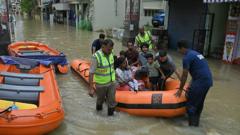Heavy rain pounded Bengaluru, often dubbed India's Silicon Valley, leading to severe flooding across several areas of the city. The city experienced a staggering 100mm (4 inches) of rain on Monday, marking a record since 2011, with officials deeming such rainfall "rare" for the region, according to CS Patil, a director at the local weather bureau.
As a result of the deluge, three individuals, including a 12-year-old boy, tragically lost their lives in rain-related incidents on Monday. The heightening rainfall prompted major tech companies to instruct employees to work from home, some due to the impassable roads caused by floodwaters.
The flooding, which began on Sunday, has led to significant disruptions and property damage throughout the city. In a notable incident within one of Bengaluru's prominent IT corridors, a compound wall belonging to the software firm i-Zed collapsed, resulting in the death of a 35-year-old female employee.
Videos circulating on social media capture commuters navigating knee-deep waters, while numerous vehicles remain stranded on inundated streets. Homes in various neighborhoods have also succumbed to flooding, compelling the city corporation to identify and address 210 flood-prone areas actively.
Despite the unfolding crisis, Karnataka's deputy chief minister, DK Shivakumar, reassured the public, stating there was no need for alarm among the citizens of Bengaluru. However, political tensions have arisen, with the opposition Bharatiya Janata Party (BJP) criticizing the Congress-led state government for its ineffective response to recurring rain-induced challenges, urging the release of 10 billion rupees ($117 million) for immediate relief efforts.
Shivakumar countered these claims by highlighting that many of the present issues have persisted for years and have often been overlooked by various successive administrations. Experts suggest that ongoing urban development, particularly over the city's lakes and wetlands, coupled with inadequate urban planning, contributes significantly to the flooding crisis. As public frustration grows, criticism against officials for their handling of the situation dominates social media discussions, while residents voice grievances about deteriorating infrastructure and submerged roadways.




















